Comprehensive Guide to Garden Maintenance in Teddington
Maintaining a beautiful garden in Teddington requires a blend of knowledge, dedication, and the right techniques. Whether you're a seasoned gardener or just starting out, understanding the specific needs of your garden can transform your outdoor space into a vibrant and thriving oasis.
In this article, we will explore the essential aspects of garden maintenance in Teddington, providing you with practical tips and strategies to keep your garden lush and healthy throughout the year.
From seasonal tasks to choosing the right plants, our guide covers everything you need to know to achieve a stunning garden that complements the charming atmosphere of Teddington.
Understanding the Importance of Garden Maintenance
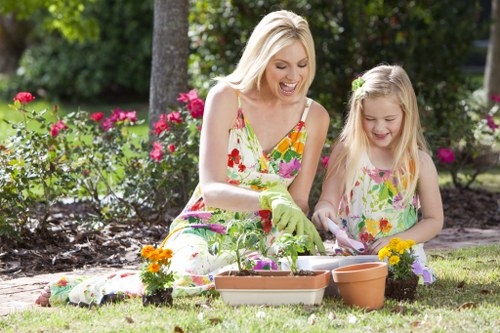
Regular garden maintenance is crucial for several reasons. It not only enhances the aesthetic appeal of your property but also ensures the health and longevity of your plants. A well-maintained garden can:
- Improve air quality by absorbing pollutants and releasing oxygen.
- Provide a habitat for local wildlife, including birds and beneficial insects.
- Increase the value of your property.
- Offer a serene environment for relaxation and recreation.
In Teddington, where the climate can influence garden health, understanding the specific requirements of your garden is essential for optimal growth and sustainability.
Maintaining your garden involves various tasks, including pruning, weeding, watering, and pest control. Each of these tasks plays a role in ensuring that your garden remains vibrant and free from common issues that can detract from its beauty.
Seasonal Garden Maintenance Tasks
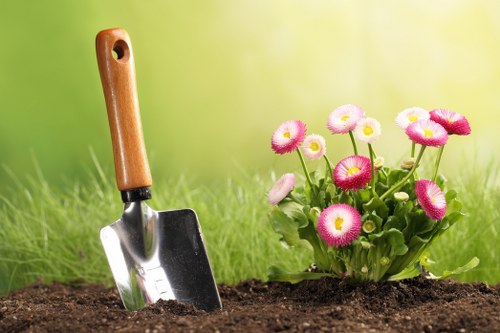
Spring
Spring is a pivotal season for garden maintenance in Teddington. As the weather warms, plants begin to wake from their winter dormancy, making it the perfect time to prepare your garden for growth.
- Pruning: Remove dead or damaged branches to encourage healthy growth.
- Soil Preparation: Enrich the soil with compost or fertilizer to provide essential nutrients.
- Planting: Introduce new plants that thrive in spring conditions.
Additionally, it's important to clean and prepare garden tools during this season to ensure they're ready for use.
Spring maintenance sets the foundation for a thriving garden throughout the year, making it essential to address these tasks promptly.
Summer Care for a Flourishing Garden
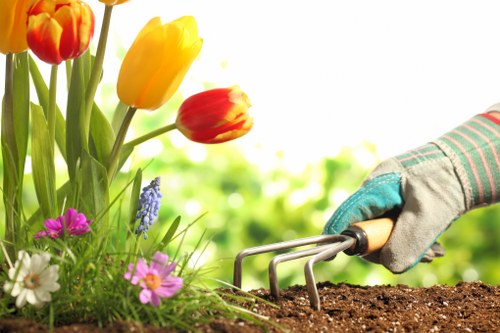
Watering Strategies
Summer in Teddington brings warmer temperatures, necessitating effective watering strategies to keep your garden hydrated.
- Consistent Watering: Water early in the morning or late in the evening to reduce evaporation.
- Deep Watering: Encourage deep root growth by watering thoroughly but less frequently.
- Mulching: Apply mulch to retain moisture and suppress weeds.
Proper irrigation not only supports plant health but also conserves water, making it a sustainable practice for garden maintenance.
Additionally, regular monitoring for pests and diseases is crucial during the summer months to address any issues promptly.
Autumn Maintenance for Garden Health
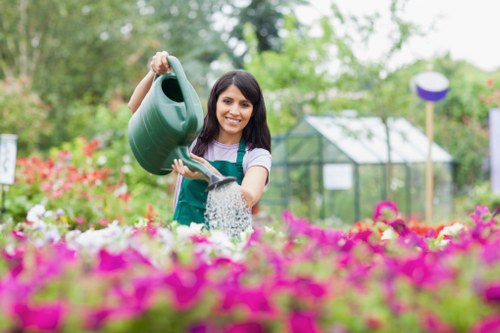
Preparing for Winter
Autumn is the time to prepare your garden for the colder months ahead. Proper maintenance during this season ensures that your garden remains resilient through winter.
- Leaf Clearing: Remove fallen leaves to prevent mold growth and promote soil health.
- Planting Bulbs: Introduce spring-flowering bulbs to add color in the upcoming year.
- Protecting Plants: Use protective coverings for sensitive plants to shield them from frost.
Additionally, it's advisable to prune back certain plants and tidy up garden beds to maintain order and readiness for spring.
Autumn tasks not only enhance the garden's appearance but also contribute to its long-term sustainability.
Winter Garden Maintenance Tips
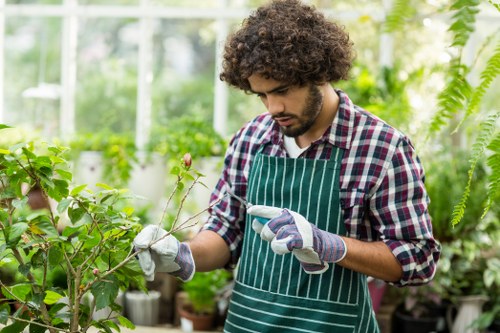
Keeping Your Garden Alive During Cold Months
Winter in Teddington can be harsh on gardens, but with the right care, your outdoor space can survive and even thrive during the colder months.
- Protection: Use burlap or other materials to protect plants from freezing temperatures.
- Minimal Pruning: Avoid heavy pruning during winter to prevent stress on plants.
- Indoor Care: Move potted plants indoors or to sheltered areas to protect them from frost.
Furthermore, maintaining garden tools and planning for the next gardening season can prepare you for a successful spring.
Embracing these winter maintenance practices ensures that your garden remains healthy and ready to burst into life once the warmer weather returns.
Choosing the Right Plants for Teddington
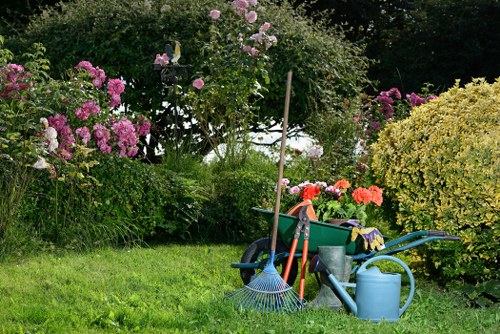
Understanding the Local Climate
Teddington's climate plays a significant role in determining the types of plants that will thrive in your garden. With a temperate maritime climate, the area experiences mild winters and warm summers, making it suitable for a wide variety of plants.
Selecting native or well-adapted plants can reduce maintenance efforts and increase the chances of success in your garden.
Popular Plant Choices
- Roses: Known for their beauty and fragrance, roses are a favorite among Teddington gardeners.
- Lavender: This hardy plant adds color and attracts pollinators.
- Boxwood: Ideal for creating structured hedges and borders.
Additionally, incorporating a mix of perennials and annuals can provide continuous blooms and interest throughout the gardening season.
By carefully selecting plants suited to Teddington's climate, you can ensure a vibrant and low-maintenance garden.
Lawn Care Essentials
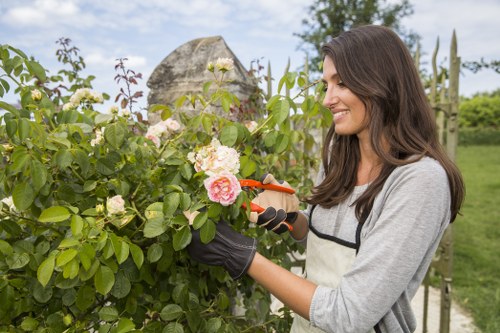
Maintaining a Healthy Lawn
A well-maintained lawn is often the centerpiece of a beautiful garden. Proper lawn care in Teddington involves regular mowing, watering, and fertilizing to keep the grass lush and green.
- Mowing: Maintain the grass at an optimal height to promote healthy growth and prevent weed invasion.
- Watering: Ensure deep and infrequent watering to encourage strong root systems.
- Fertilizing: Apply balanced fertilizers to provide essential nutrients to the lawn.
Additionally, addressing common lawn issues such as pests, diseases, and bare patches promptly can prevent long-term damage.
Regular maintenance practices contribute to a resilient and attractive lawn that enhances the overall appeal of your garden.
Pruning and Trimming Techniques
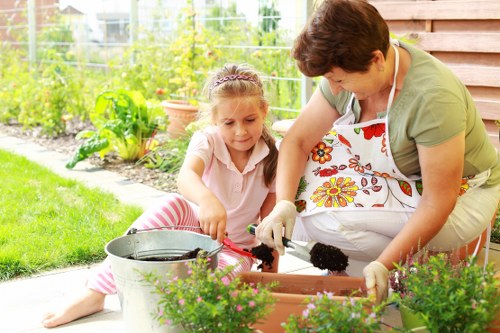
Enhancing Plant Health
Pruning and trimming are vital for maintaining the shape, size, and health of your plants. Proper techniques ensure that plants receive adequate sunlight and air circulation, preventing diseases and promoting growth.
Tools and Best Practices
- Choosing the Right Tools: Use sharp and clean tools to make precise cuts and reduce the risk of infection.
- Pruning at the Right Time: Different plants have specific pruning seasons that maximize their growth potential.
- Technique: Make clean cuts at a 45-degree angle to facilitate healing.
Regular pruning not only keeps plants looking their best but also extends their lifespan and vitality.
By mastering these techniques, you can ensure that your garden remains well-shaped and flourishing.
Pest and Disease Control
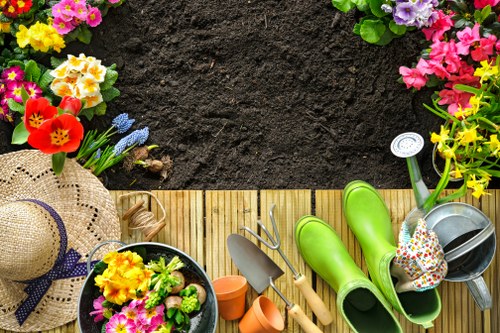
Identifying Common Issues
Pests and diseases can significantly impact the health of your garden. Recognizing the signs early allows for timely intervention and minimizes damage.
- Common Pests: Aphids, slugs, and caterpillars are typical garden nuisances in Teddington.
- Diseases: Fungal infections like powdery mildew and rust can affect a variety of plants.
Implementing integrated pest management strategies, such as introducing beneficial insects and using organic treatments, can effectively control these issues without harming the ecosystem.
Maintaining a vigilant approach to garden health ensures a vibrant and pest-free environment.
Irrigation and Watering Strategies
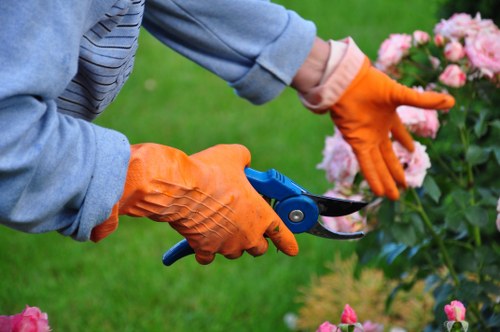
Efficient Water Management
Effective irrigation is essential for a healthy garden, especially during the warmer months. Understanding the specific water needs of different plants helps in planning an efficient watering schedule.
- Drip Irrigation: Provides targeted watering, reducing water wastage and promoting deep root growth.
- Rainwater Harvesting: Collecting and utilizing rainwater is an eco-friendly way to water your garden.
- Automated Systems: Installing timers and sensors can optimize water usage based on weather conditions.
Proper irrigation not only conserves water but also ensures that your plants receive the hydration they need to thrive.
Adopting these strategies contributes to a sustainable and flourishing garden environment.
Soil Health and Fertilization
[IMG_11]Enhancing Soil Quality
Healthy soil is the foundation of a thriving garden. Understanding and maintaining soil health involves regular testing and appropriate amendments to ensure it is rich in nutrients and well-draining.
- Soil Testing: Conducting periodic tests helps in identifying nutrient deficiencies and pH imbalances.
- Organic Matter: Incorporating compost and organic matter improves soil structure and fertility.
- Fertilization: Applying balanced fertilizers provides essential nutrients tailored to your plants' needs.
Moreover, practices like crop rotation and mulching can prevent soil depletion and promote long-term health.
By prioritizing soil health, you ensure that your garden remains robust and productive.
Garden Design Ideas
[IMG_12]Creating an Aesthetically Pleasing Garden
Garden design plays a crucial role in the overall appeal and functionality of your outdoor space. Thoughtful design considerations can transform your garden into a harmonious and inviting area.
Key Design Elements
- Layout: Plan paths, beds, and focal points to create a balanced and navigable space.
- Plant Selection: Choose a variety of plants with different textures, colors, and heights for visual interest.
- Lighting: Incorporate garden lighting to highlight features and extend usability into the evening.
Additionally, integrating water features, seating areas, and decorative elements can enhance the garden's functionality and beauty.
A well-designed garden not only looks stunning but also provides a peaceful retreat for relaxation and enjoyment.
Hiring Professional Garden Maintenance Services
[IMG_13]Benefits of Professional Assistance
While DIY garden maintenance can be rewarding, hiring professional services in Teddington offers several advantages. Professionals bring expertise, experience, and the right tools to ensure your garden receives the care it needs.
- Expert Knowledge: Professionals understand the local climate and plant requirements, ensuring optimal garden health.
- Time-Saving: Outsourcing maintenance frees up your time to enjoy your garden without the hassle of upkeep.
- Quality Results: Experienced gardeners can achieve a higher standard of maintenance and aesthetics.
Moreover, professional services can provide tailored solutions based on your garden's unique needs, enhancing its beauty and functionality.
Investing in professional garden maintenance ensures a well-kept and thriving garden with minimal effort on your part.
DIY Garden Maintenance Tips
[IMG_14]Practical Tips for Home Gardeners
For those who prefer a hands-on approach, DIY garden maintenance can be both fulfilling and cost-effective. Here are some practical tips to help you maintain your garden effectively:
- Regular Weeding: Keep weeds at bay by removing them promptly to prevent competition for nutrients.
- Proper Tool Maintenance: Keep your garden tools clean and sharp for efficient and safe use.
- Composting: Create your own compost to recycle garden waste and enrich your soil.
Additionally, taking the time to learn about plant care and gardening techniques can enhance your skills and garden success.
Embracing these DIY practices allows you to take full control of your garden's upkeep and enjoy the rewards of your hard work.
Environmental Considerations in Garden Maintenance
[IMG_15]Sustainable Gardening Practices
Incorporating environmentally friendly practices into your garden maintenance routine can contribute to sustainability and reduce your ecological footprint.
- Water Conservation: Implementing efficient irrigation systems and mulching can significantly reduce water usage.
- Organic Gardening: Avoiding chemical pesticides and fertilizers promotes a healthy ecosystem.
- Native Plants: Choosing native species supports local biodiversity and requires less maintenance.
Moreover, composting and recycling garden waste help in reducing landfill contributions and enriching your soil naturally.
Adopting these sustainable practices ensures that your garden remains beautiful while also being kind to the environment.
Maintaining Garden Tools
[IMG_16]Extending the Life of Your Tools
Proper maintenance of garden tools is essential for their longevity and effectiveness. Well-maintained tools not only perform better but also ensure safety during use.
- Cleaning: Remove dirt and debris after each use to prevent rust and corrosion.
- Sharpening: Keep blades sharp for efficient cutting and reduced effort.
- Storage: Store tools in a dry place to protect them from moisture and damage.
Additionally, regular inspections for wear and tear allow you to address issues before they escalate, ensuring your tools remain in top condition.
Investing time in tool maintenance pays off by extending their lifespan and enhancing your gardening experience.
Conclusion
[IMG_17]Garden maintenance in Teddington is a rewarding endeavor that can yield stunning results when approached with care and knowledge. By understanding the unique needs of your garden, implementing seasonal maintenance tasks, and considering both professional and DIY options, you can create a thriving outdoor space that reflects your personal style and complements the beauty of Teddington.
Remember, a well-maintained garden not only enhances your home's appeal but also contributes positively to the environment and your well-being.
Contact us today to learn more about how we can help you achieve the garden of your dreams or book your service now for expert garden maintenance tailored to your needs.